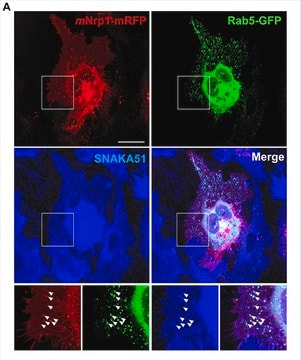I8638
Anti-Integrin β1 antibody, Mouse monoclonal
clone W1B10, purified from hybridoma cell culture
Synonyme(s) :
Anti-CD29
About This Item
Produits recommandés
Source biologique
mouse
Niveau de qualité
Conjugué
unconjugated
Forme d'anticorps
purified from hybridoma cell culture
purified immunoglobulin
Type de produit anticorps
primary antibodies
Clone
W1B10, monoclonal
Forme
buffered aqueous solution
Poids mol.
antigen 100-140 kDa
Contient
15 mM sodium azide
Espèces réactives
chicken
Technique(s)
immunoprecipitation (IP): suitable
indirect immunofluorescence: suitable
western blot: 1:200 using denatured, non-reduced extract of cultured fibroblasts from chicken embryo lower leg
Isotype
IgG1
Numéro d'accès UniProt
Conditions d'expédition
dry ice
Température de stockage
−20°C
Modification post-traductionnelle de la cible
unmodified
Informations sur le gène
chicken ... ITGB1(374058)
Description générale
Spécificité
Immunogène
Application
Actions biochimiques/physiologiques
Forme physique
Clause de non-responsabilité
Vous ne trouvez pas le bon produit ?
Essayez notre Outil de sélection de produits.
Code de la classe de stockage
10 - Combustible liquids
Classe de danger pour l'eau (WGK)
nwg
Point d'éclair (°F)
Not applicable
Point d'éclair (°C)
Not applicable
Certificats d'analyse (COA)
Recherchez un Certificats d'analyse (COA) en saisissant le numéro de lot du produit. Les numéros de lot figurent sur l'étiquette du produit après les mots "Lot" ou "Batch".
Déjà en possession de ce produit ?
Retrouvez la documentation relative aux produits que vous avez récemment achetés dans la Bibliothèque de documents.
Notre équipe de scientifiques dispose d'une expérience dans tous les secteurs de la recherche, notamment en sciences de la vie, science des matériaux, synthèse chimique, chromatographie, analyse et dans de nombreux autres domaines..
Contacter notre Service technique








